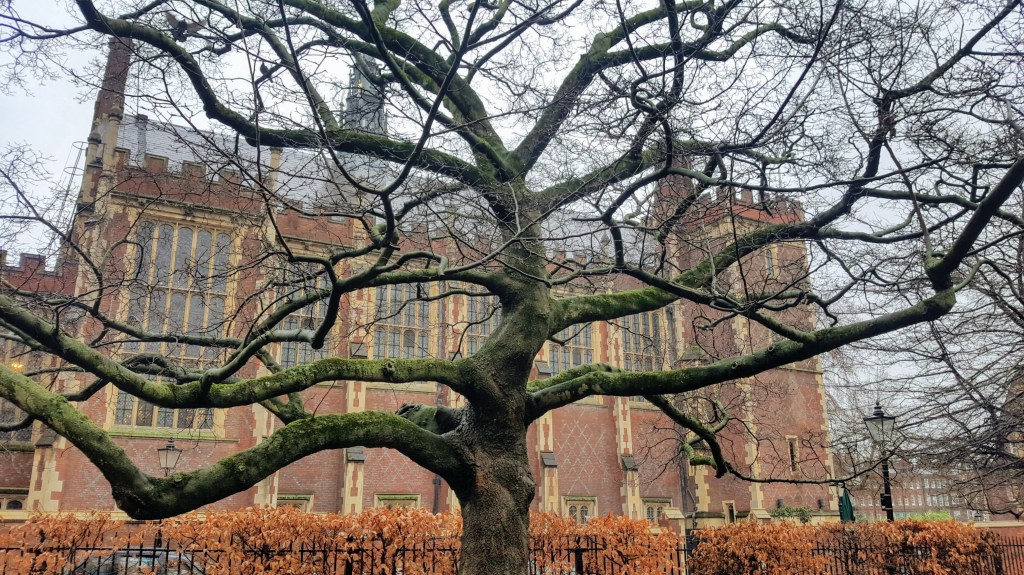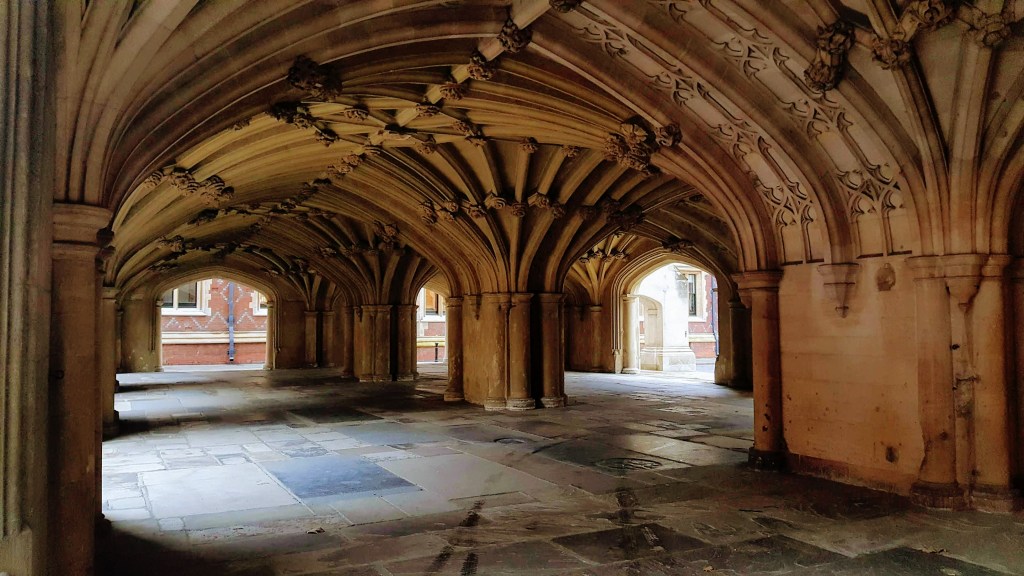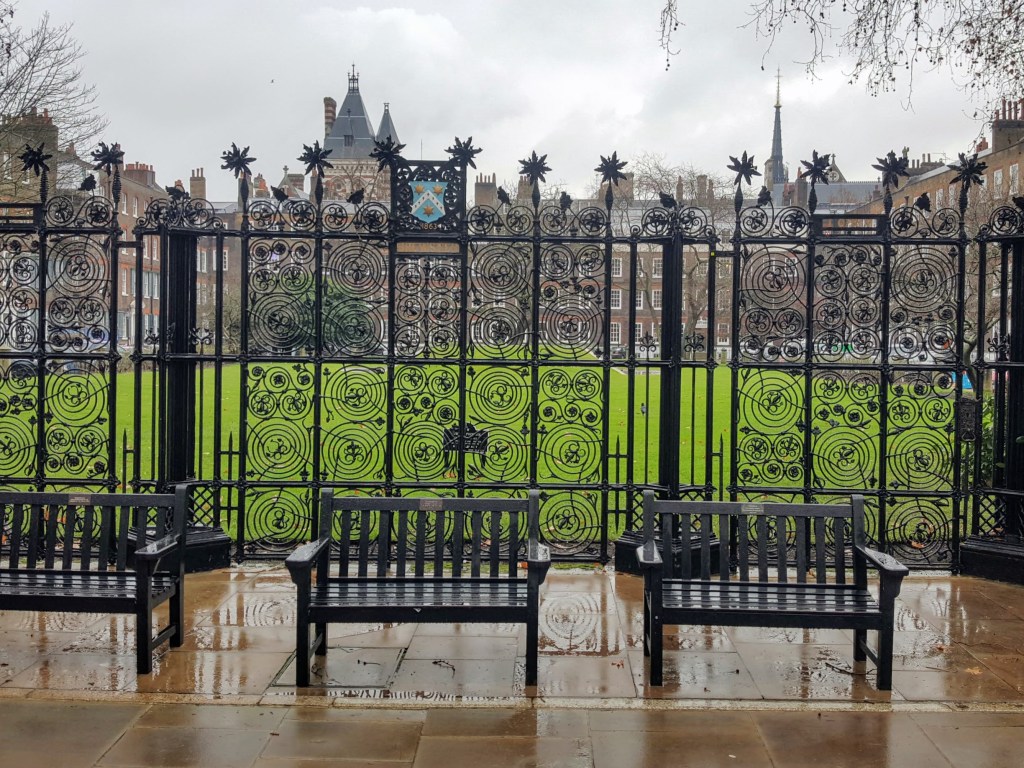Zoom works quite well for a ghost story. Get the lighting right and a disembodied head fills the screen, lit by laptop glow. You can even choose your own gothic background.
There were no such theatrics when we spoke to Clive Thornton, a retired lecturer and writer of books on law. His memories of ‘passing the Bar’ as a law student at Lincoln’s Inn – with its tradition of delivering lectures via a series of dinners – are strange enough as it is.
Clive is a lifelong fan of Dickens; his tale has the tone of a traditional ghost story. Whether or not it is more than that, we leave up to you. In these dark, winter nights, we thought it worth recounting, either way.

The Dark Beneath the Chapel
“London in 1970 wasn’t like today. There was nothing to do, not without money. I read a lot of novels, and there was the occasional rock concert. But mostly I hung around in digs. I tried to avoid the weirder parties; the hippy thing had gone a bit sour by then. Passively inhaling pot smoke at The Incredible String Band at the Roundhouse was counter-culture enough for me.
It was at Lincoln’s Inn itself I came closest to the darker side of the long sixties.
The whole dinners thing is more up-to-date nowadays, I hope. Back then it was like the 18th Century. All ‘my learned friends’ and wigs still on from court. Lectures delivered by a decrepit law lord, cracking jokes so laboured you could hear him wind them up. You could spot the up-and-coming barristers around the hall, forcing a chuckle, wiping an eye. ‘Oh, M’lud is so droll’.
To look at the buildings where the dinners took place you’d think you’d be getting a Tudor feast. But the food was more 1950s English hotel. Soup stone-cold through neglect not deliberation. A stale bread roll. A pallid roast dinner. Pudding was spotted dick, served with custard you could eat with a knife and fork. I think they reserved all the budget for the wine cellar – the best in Europe, they said. The waiters were clearly helping themselves to the port, and good for them.

After dinner we’d retire for more port, wine and sycophancy. Over the course of the evenings I had gravitated towards these sort of age-of-decadence types, who’d lounge in a dark corner, avoiding the judges and barristers. I suppose they were part-time occultists. All Aleister Crowley and Black Masses in Mayfair. Their leader was a young aristocrat who called himself de Wolfe.
I considered my family relatively well-off, but as a lad from Lancashire I was treated like a rare specimen – “Where are you from? God, how ghastly”. When I told them I voted Labour, I simply wasn’t believed. But we bonded over psychedelic rock, and a shared disapproval of the whole event.
The night in question was January or February: deathly cold even in the halls. The fog outside the grand windows was positively Dickensian. Things were winding down. De Wolfe had just told his favourite Lincoln’s Inn ghost story – in which the strange deaths of two Edwardian barristers were attributed to a demonic bird-like creature – and had moved on to loudly proclaiming his own occult powers.

His bluff was called by Hennessy (there were never any first names), a young woman who gave the impression of being as much into the style as the substance of the underworld.
“Bollocks, De Wolfe. You’re about as convincing as that ‘dark priest’ last night”.
De Wolfe waved a hand. “He was a fraud, of course. True occultists don’t dance around Berkeley Square mansions, nor fly-poster their ceremonies all over London. I’ve darker abilities than him and I’ll prove it. Death’s Justice. Tonight.”
I remember this caused a stir, and in particular rattled a young man named Muncey, who sat next to me shaking his head, as de Wolfe proceeded to prowl around the room, surreptitiously pocketing a bundle of something from a drawer, then distracting what was left of the crowd while Hennessy brazenly took something else from a display cabinet.
“Put that back!” said Muncey, when Hennessy returned to our corner.
But the group were already halfway out the door, and Muncey followed, as did I.

De Wolfe led us to the 17th century undercroft, and as we shivered in the dark beneath the chapel, waiting for the last of the Inn’s lights to go out and the staff to shuffle off into the fog, de Wolfe told me about ‘Death’s Justice’.
First I should describe the chapel’s undercroft. Along with the little legal bookshop (down a closed alley like something out of Bleak House), the ground-level undercroft was a place I often found myself. It had a beautiful vaulted ceiling. The poor and desperate once left their babies there, to be raised by the Inn. In the daytime the light was very calming, and I would linger and listen to music drift down from the chapel above.
But I’d never before been there at midnight, with fog curling in through the arches and across the floor made up of gravestones of notable members of the Inn.
Now, de Wolfe held a lighter to one of the gravestones: one Horace Dreyfort, died 1887.
“Lord Dreyfort,” explained de Wolfe. “The Lord Goddard of his time – down to the stained trousers, I bet. Feared by all. And known to this day as Death’s Justice“.

As a High Court judge, Dreyfort had been known for his liking for sending men to the gallows. The item which Hennesy had lifted from the display case – and which Muncey was still begging her to return – was Dreyfort’s black cap – the square of cloth he had placed atop his wig when he passed a sentence of death.
De Wolfe took it from Hennessy. The five of us now stood in a circle – or a pentangle, I suppose – and de Wolfe took the stolen candles from his pocket, lit them one by one, and handed one to each of us in turn.
Poor Muncey was positively vibrating beside me, muttering no, no, no, as de Wolfe began a bizarre incantation. There was latin in there, lord knows what else. I was certain he’d lifted it from a Hammer film. I was stifling the giggles.
Then the chant stopped. I have to admit there was something chilling in the silence, then. De Wolfe had explained the ritual. Having supposedly summoned the spirit of Lord Dreyfort, Death’s Justice, he now proceeded to pass the black cap around the group. Each of us was to place it on our head in turn. Whosoever’s candle went out – he or she would be first to die.

Nonsense, obviously, but I have to admit they’d chosen an atmospheric setting. In the mist, candlelight flickered across branches of stone. I’d had a fair amount to drink, too. Which perhaps explains what follows.
Hennesy was stood to de Wolfe’s left, smiling as her turn wearing the black cap passed without event. Next was a man called Perkins. Again his flame was unchanged. He passed the black cap to me. I must admit I was shaking a little myself, at this point. The idea of putting this cursed item on my head did not exactly thrill me. But you go along with it, don’t you?
And there was a little flickering of my candle! By god, I remember that. But the flame burned on, and I passed the cap to poor Muncey – a gibbering jelly by now. I helped him get the cap on and he stood there weeping, two hands on the candle, and his flame died – but only for the briefest moment: it flared again and even stayed alight when Muncey, finished off by now, dropped it to the gravestones below.
So, there was only de Wolfe left. We silently watched as Muncey reluctantly handed him the cap.
“Stop this madness, de Wolfe,” said Muncey.
But de Wolfe only grinned, and placed the black cap on his head.
I’ve never been able to explain what happened next. I can only describe what I saw, and say that I never thought of de Wolfe as a fraud or a trickster. He believed in what he espoused.

The black cap had been on de Wolfe’s head for less than five seconds when his candle flame went dead. There was no flickering, no smoke; it went out cold. There had been no breeze. Nobody had moved.
That was frightening enough. But I had seen something else that turned my heart icy with fear. Something I can’t explain to this day. At the moment de Wolfe’s candle went out, I saw a movement in the shadows behind him. From the gloom of a pillar, a horrible shape like an outstretched hand had formed itself, and reached towards de Wolfe as if from a dark, heavy cloak.
Then the vision was gone, and I was aware that Muncey was speaking.
“Now will you return the cap?”
De Wolfe was playing it cool. “Return it? You saw the trouble we went to to steal it. Quite the little coup.” He placed the black cloth in his pocket. “No, this will be my little souvenir, especially since I’ll be first to cop it. I wonder how long I’ve got?”
Hennesy and Perkins seemed unfazed too. They blew out their candles, saying, “That’s that, then”. I think they had another seance to get to.
I had a strong desire to run from that place, and an even stronger feeling that Muncey was right: the cap must be returned. I was about to say as much when we were all interrupted by a loud “Oi!” from the fog beyond the undercroft, and a warden’s torch shining in our eyes.
We ran for it. The rest is a bit of a blur. I do remember losing everyone, blundering about in the fog, scared out of my wits, and eventually making it back to my digs.
That was perhaps the last of the dinners, because I don’t believe I saw de Wolfe again. I often wondered what happened to him. These days, I suppose I’d look him up on social media. Back then you just lost touch. People vanished into the ether”.

The lost year
PoL couldn’t help wondering ourselves what had happened to de Wolfe. We sent a transcript of Clive’s story to a friend of ours, Graham Herod. Graham worked for many years as a City of London tour guide. We wanted to know if the story rang any bells. His email came back within a couple of hours:
“I don’t know about ‘de Wolfe’ but there was a Derwent Wolfram who was a young Lincoln’s Inn barrister. Found dead in his New Square flat in the most horrific and strange circumstances. January, 1971. His neck and throat showed all the signs of being subjected to a hanging. But here’s the strange part: no rope was ever found, nor did it appear that anyone had entered or exited the flat.
Could be our man?
About Lord Dreyfort’s black cap, I’m more certain – I’ve seen it myself. It is still in a display cabinet in Lincoln’s Inn. The warden there told me a few strange and gruesome stories attached to it. But get this: One of the legends is of the cap’s ‘lost year’. Apparently it vanished early 1970. Presumed stolen and given up for lost. Except it mysteriously reappeared in the now-locked cabinet, exactly one year later: January, 1971.”
- Candidate: The dark beneath the Chapel
- Type: Spectral breach
- Status: Historic
with thanks to RMC Duxbury

Very good! After my Sebald comment and yours, I am now re-disappearing down the Rings of Saturn.
LikeLiked by 1 person
Oh good, maybe I’ll join you! It is a book that seems different every time I pick it up.
LikeLike
Excellent read!
LikeLiked by 1 person
Thank you, glad you liked it!
LikeLike
Excellent as always
LikeLiked by 1 person
Thank you!
LikeLike
Clive Thornton was a good writer, feels like I was there – brrr. As you say clearly influenced by Dickens, and also by writers of material on paranormal phenomena – “ghost stories” – of the early 20th century.
LikeLiked by 1 person
Nice touch with the 2 solicitors killed in Lincolns Inn by the bird like creature.
(and thanks, I enjoy these posts)
LikeLiked by 1 person
Thanks, I’m glad you liked it. It’s worth looking up that bird-creature legend, there’s some good articles online.
LikeLike
What a spine tingling tale. Many thanks for posting this.
LikeLiked by 1 person
Thank you, glad you liked this one.
LikeLike